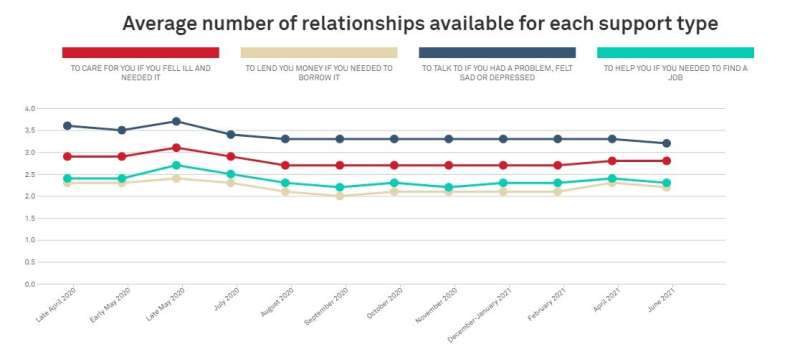
The emotional wear and tear of pandemic-induced isolation played havoc with social connections. And it may take a while for U.S. adults to repair those interrupted relationships with friends and family members, according to a new survey by researchers from Northeastern, Harvard, Northwestern, and Rutgers.
The toll of lockdowns on personal relationships is higher now than during the onset of the pandemic, according to the research, even with declining coronavirus infection rates, improving job prospects, and a reopened economy. And men seem to be the hardest hit in recovering from the isolation.
“Just because we can have dinner with people again doesn’t mean those relationships are back to where they were,” says David Lazer, university distinguished professor of political science and computer sciences at Northeastern and one of the researchers who conducted the study.
“There is the question of what effects this decay on our personal relationships has had on our lives, and how much are we bouncing back from it,” he says. The data suggest that the bounceback is still a work in progress.
Researchers surveyed more than 185,000 U.S. residents between April 2020 and June 2021, in part to record how many respondents had friends and relatives they could lean on if they suddenly became ill and required care, needed child care in a pinch, or could talk to if they had an emotional issue.
The study did not examine the quality of relationships before the coronavirus took hold to provide a comparative baseline, but “if you look overall at the levels of social isolation, we are substantially higher now than we were at the beginning of the pandemic, especially in terms of the emotional element,” says Lazer, who expressed surprise at the findings.
About 32 percent of respondents in June 2021 reported having just one person or no one in their lives with whom they could share their feelings. That was up from 24 percent in April 2020, reflecting a pronounced decline in the reach of personal relationships.
“The situation seemed to deteriorate through the summer of 2020 and then stays pretty bad before hitting an apex in June of 2021. That’s not at all what I would have expected on the emotional isolation front,” says Lazer.
More men (35 percent) than women (30 percent) said they did not have someone to confide in. They were also more likely than women (37 percent to 33 percent, respectively) not to have someone to care for them if they should get sick. “Stereotypes aside, males are less likely to have emotionally supportive bonds,” Lazer says.
Both men and women, however, were about even when it came to having a friend to borrow money from or to help find employment.
It could take a year or two for those broken relationships to become whole. Some may never be repaired, researchers say.
“Some of those relationships have probably faded and it’s going to take time to resuscitate them or build new ones,” Lazer says. “Some of it may be a reappraisal of who we want to be friends with. It takes a long time to make an old friend.”
Besides gender, the study also found significant differences across racial and ethnic groups.
White respondents had a larger support network they could tap into compared to Black, Hispanic, or Asian American respondents. The gap is consistent regarding emotional support, where white respondents reported feeling closer to those who could offer emotional and caring nurturing.
Major gaps were also found among education and income levels. Well-educated and affluent people were significantly more likely to say they had someone to take care of them. On the other hand, there was a marked deterioration among the less affluent and educated.
Source: Read Full Article
